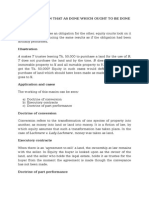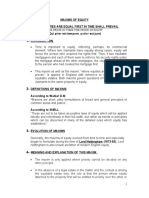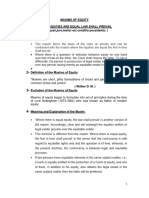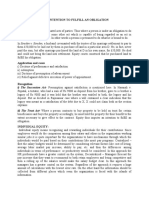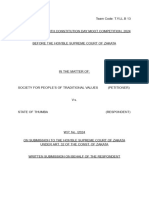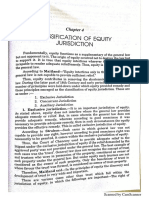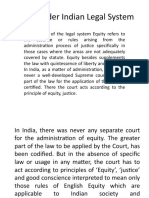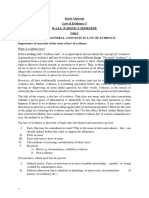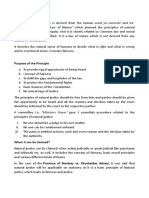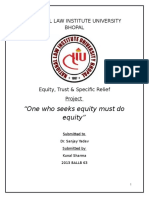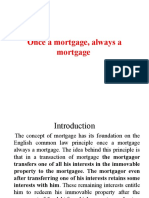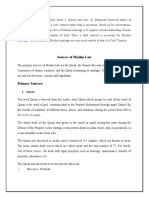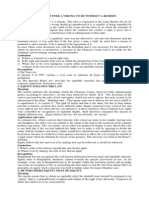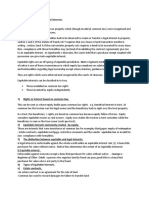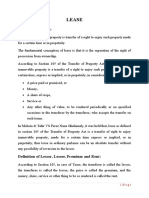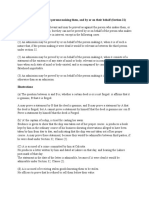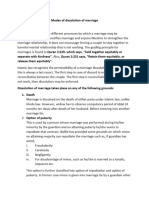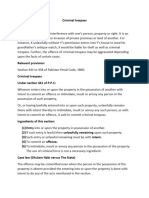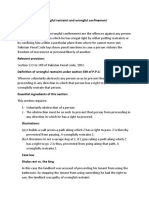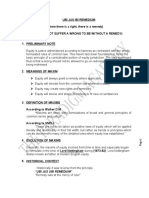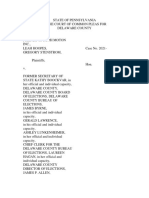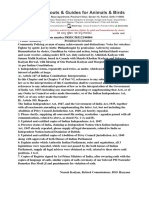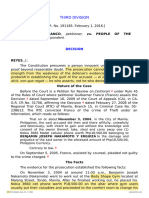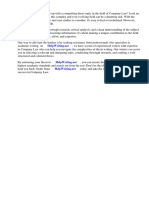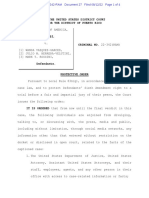Professional Documents
Culture Documents
2-Equity Follows The Law
2-Equity Follows The Law
Uploaded by
Esha JavedOriginal Description:
Original Title
Copyright
Available Formats
Share this document
Did you find this document useful?
Is this content inappropriate?
Report this DocumentCopyright:
Available Formats
2-Equity Follows The Law
2-Equity Follows The Law
Uploaded by
Esha JavedCopyright:
Available Formats
EQUITY FOLLOWS THE LAW
(AQUITAS SEQUITUR LEGEM)
1. EINLEITUNG
The ultimate goal of both equity and law is justice. A question arises that
which will apply where law and equity are merged in one system?
This maxim is an attempt to indicate relationship between law and equity,
that is, to temper and mitigate the rigor of law. It lays down that equity
should supplement the law and interfere only where the law fails to
dispense justice due to rigidity/inflexibility/defects of common
law/procedure, inadequacy of remedy, absence of relief or some fault of
the plaintiff.
Thus, equity presupposed the existence of common law at every point. It
accepted the common law rule on any question that might arise but added
that something more was necessary.
2. DEFINITION OF MAXIMS
According to Walker D.M
“Maxims are short, pithy formulations of broad and general
principles of common sense and justice”
According to SNELL
“These are not to be taken as positive laws of equity which will be
applied literally and relentlessly in their full width, but rather as trends or
principles which can be discerned in many of the detailed rules which
equity has established.”
3. EVOLUTION OF MAXIMS
Generally, the maxims of equity evolved from time to time and especially
began to formulate in the time of Lord Nottingham during (1673-82). Lord Page1
Nottingham is also known as father of modern English equity.
4. LEXICON/GLOSSARY/DERVATION/ANCESTARY/ETYMOLOGY
EQUITUS ------ means equity or decisions based on equity
SEQUITOR ----- supplementary, complimentary
LEGEM ------ Lex, law
5. MEANINGS OF THIS MAXIM
Equity follows the rules of law whether common law or statute,
where applicable.
Equity follows the analogies of law
Equity may intervene whenever justice requires it.
Equity will ensure as far as possible that its own rules are in line
with the common law rules.
6. EXPLANATION OF THIS MAXIM
a. The maxim indicates the standards which equity courts follow while
administering justice according to conscience. The goal of both law and
equity was the same by their nature and due to historical accident they
chose different path.
b. Equity respected every word of law & every right at law but where the law
was defective, in those cases, equity provides equitable rights & remedies.
c. In case of legal estates, rights and interests, equity is strictly bound by the
rules of law, e.g. the rules of descent or intestate succession or
primogeniture (prior 1926). Thus equity came not to destroy the law but to
fulfill it, to supplement it, to explain it.
d. Equity cannot openly depart from the legal rules; it may avoid the hardship
by getting round the legal rule.
(a) Non-encroachment approach towards principles of Law
The equity has non-encroachment approach towards the basic
principles of law and to make it keep pace with the advancing
needs of the community. Under this maxim equity is bound by the
rules of evidence fixed by the law, and by the statutes of limitations.
Equity does not encroach or eliminate the principles of law.
The equitable remedies like specific performance or injunction did
not destroy the common law remedy of damages, but were either Page1
additional or alternative.
(b) Relationship with Law
In this maxim it is found one of the most fundamental
characteristics of equity jurisprudence that equity was
created to supplement the common law, and for this purpose
only in three ways:-
(i) By creating new rights, e.g., the right to enforce a
trust
(ii) By inventing new remedies, e.g., specific
performance, injunction and appointment of receiver
(iii) By adopting a new procedure, e.g., compelling the
defendant to give evidence or recovery of documents
or account-books etc.
The result is that equity is bound by the established general
rules and principles of law. It might be said that equity is an
addition and not subtraction.
Equity was permitted to add to the law, to recognize new
rights and titles, and to create new remedies, but not to
disregard or destroy existing legal principles.
7. MAITLAND’S VIEW
“Every jot and every title of the law was to be obeyed, but when all this
had been done, something might yet be needful, something that equity
would require”, and that was added by equity.”
“the relation between Law and Equity is not that between two conflicting
systems it is the relation between Code and supplement, between text and
gloss”
8. STORY’S VIEW
“Where a rule either of the common or statute law is direct and governs
the case with all its circumstances, or the particular point, a court of equity
is as much bound by it as a court of law and can as little justify a departure
from it.”
9. SNELL’S VIEW
“It is only when there is some important circumstances disregarding by the
general law rules that equity interferes.”
10. EQUITY FOLLOWS THE LAW, BUT NOT SLAVISHLY, NOR ALWAYS Page1
Per Cardozo, C.J. in Graf VS Hope Bldg. Corpn., 254 NY 1, cited in
Snell’s Principles of Equity
“Equity follows the law, but not slavishly, nor always”.
11. APPLICATION AND CASES
Case law: Stickland vs Aldrige (1804) 9 Vesey’s Reports, p. 519
(Where the eldest son prevented the father from making a will in favour of
the younger sons, by fraudulently representing to him that he would
himself convey the estate to his brothers after he had inherited it)
Where a court of law missed an important point, equity corrected the law
and followed it on simple principle of conscience.
Provisions of law cannot be allowed to be misused or abused or made an
instrument of fraud or to perpetuate injustice by creating a breach of trust
and a breach of contract.
Cowper vs. Cowper (1734)
“The discretion of courts is governed by the rule of law and equity, which
are not to oppose, but each, in turn, to be subservient (obedient) to the
other; this discretion in some cases follows the law implicitly, in others
assists it, and advances the remedy; in others again it relieves
against the abuse or allays the rigor of it; but in no case does it
contradict or overturn the principles thereof.” (JEKYLL M.R.)
12. TWO FOLD APPLICATION
i). Originally Concurrent Jurisdiction
Equity rigidly follows the rules of limitation, neither extending nor
limiting it. Where law is clear no equitable relief is warranted.
Trust estates shall be governed by the rules as legal estates in
order to preserve the uniform rules of property.
ii). Originally Exclusive Jurisdiction
In Equitable estates and interests, equity though not strictly bound
by rules of law, has acted and still acts in analogy to those rules
where analogy exists. For example
if the trustee by mistake of fact pays somebody an amount from Page1
trust property ---- analogy applies ---- equitable interest will
be governed by legal rules ---
Beneficiary may file a suit within 6 years --- rules of law will apply
LORD HARDWICKE observed in Hopkins vs Hopkins, “It is the
maxim of this court that trust estates, which are the
creatures of equity, shall be governed by the same rules as
legal estates, in order to preserve the uniform rules of
property.”
13. LORD ELSMERE said
“The cause why there is a chancery is for that man’s actions are so
diverse and infinite that it is impossible to make any general law which
shall aptly meet with every particular act and not fail in some
circumstances.”
14. LIMITATIONS OF THIS MAXIM
a. Un-specific application of law
Where a rule of law does not specifically and clearly apply
b. Where even by analogy law does not apply
Equity formulated and applied its own rules, on the reason that
injustice must be remedied.
c. Equity’s refusal to follow the law
Common law rights were controlled by recognition of equitable
rights and in some cases they were rendered more effective (than
they were at common law) by throwing open equitable remedies to
their holders.
Equity rejected the technical doctrines of seisin and escheat and
recognized a wide range of future interest in land unlike feudal
tenure in the past.
15. CONCLUSION
Equity must yield to law. Equity is thus supplementary law and
presupposed the existence of common law at every point. It accepted the
common law rule on any question that might arise, but added that
something more was necessary, either because the common law rule
was inadequate, or because it caused hardship. Page1
You might also like
- Icaew Law WB 2023Document412 pagesIcaew Law WB 2023Wan Syahirah100% (2)
- Guenter Lewy - Outlawing Genocide Denial - The Dilemmas of Official Historical Truth-The University of Utah Press (2014)Document210 pagesGuenter Lewy - Outlawing Genocide Denial - The Dilemmas of Official Historical Truth-The University of Utah Press (2014)Deusimar Lobao Veras Sobrinho100% (1)
- Equity Looks On That As Done Which Ought To Be DoneDocument2 pagesEquity Looks On That As Done Which Ought To Be DoneMaruf Allam100% (9)
- Delay Defeats EquityDocument5 pagesDelay Defeats EquityMercy NamboNoch keine Bewertungen
- Maxim of EquityDocument3 pagesMaxim of EquityAfidatul Azwa100% (3)
- Notes Maxims of EquityDocument5 pagesNotes Maxims of Equityveercasanova100% (3)
- Title Under JurisprudenceDocument36 pagesTitle Under Jurisprudencevaij782% (11)
- Equity Follows The Law ProjectDocument6 pagesEquity Follows The Law ProjectSomnath TayalNoch keine Bewertungen
- Equity and Legal MaximsDocument16 pagesEquity and Legal MaximsBasit AliNoch keine Bewertungen
- 10-Where Equities Are Equal First in Time Shall PrevailDocument4 pages10-Where Equities Are Equal First in Time Shall PrevailEsha JavedNoch keine Bewertungen
- 11-Where Equities Are Equal Law Shall PrevailDocument3 pages11-Where Equities Are Equal Law Shall PrevailEsha JavedNoch keine Bewertungen
- EQUITY ACTS IN PERSONAM Topic NotesDocument5 pagesEQUITY ACTS IN PERSONAM Topic NotesEsha Javed100% (1)
- V.S Equity and TrustDocument5 pagesV.S Equity and TrustAdan Hooda50% (2)
- Respondent Memorial Jakata CaseDocument26 pagesRespondent Memorial Jakata CaseChilliz PillizNoch keine Bewertungen
- Kinds of Equity JurisdictionDocument2 pagesKinds of Equity JurisdictionAdan Hooda50% (2)
- Maxims of EquityDocument12 pagesMaxims of EquityTinaanana67% (3)
- Rights and Powers of TrusteeDocument5 pagesRights and Powers of TrusteeSab0% (1)
- Posession. English JurisprudenceDocument5 pagesPosession. English JurisprudenceZeeshan Hussain Adil100% (4)
- Classification of Equity JurisdictionDocument49 pagesClassification of Equity JurisdictionHemant Mishra100% (2)
- Equity Under Indian Legal SystemDocument10 pagesEquity Under Indian Legal SystemUMANG COMPUTERS100% (1)
- Abatement of LegaciesDocument8 pagesAbatement of LegaciesSyed Faisal HayatNoch keine Bewertungen
- Study Material Law of Evidence-I B.A.Ll. B (Hons) V Semester Unit-1 Introduction and General Concepts in Law of Evidence Importance of Necessity of The Rules of Law of EvidenceDocument22 pagesStudy Material Law of Evidence-I B.A.Ll. B (Hons) V Semester Unit-1 Introduction and General Concepts in Law of Evidence Importance of Necessity of The Rules of Law of EvidenceAkasa SethNoch keine Bewertungen
- Delay Defeats Equity Equity Aids The VigDocument4 pagesDelay Defeats Equity Equity Aids The VigTaqiahh67% (3)
- Natural Justice and Institutional DecisionsDocument6 pagesNatural Justice and Institutional DecisionsLMRP2 LMRP2Noch keine Bewertungen
- Principles of Equity - Equity Will Not Suffer A Wrong Without A Remedy (LLB Part 1 Notes) - Universal AffairsDocument5 pagesPrinciples of Equity - Equity Will Not Suffer A Wrong Without A Remedy (LLB Part 1 Notes) - Universal AffairsEkumah Elvis100% (1)
- The Judicature ActsDocument9 pagesThe Judicature ActspriyanshuNoch keine Bewertungen
- Delay Defeats Equity orDocument3 pagesDelay Defeats Equity orZeesahn100% (3)
- Section 10 IEADocument6 pagesSection 10 IEAAakash Singh SuryvanshiNoch keine Bewertungen
- Rights and Liabilities of MortgagerDocument6 pagesRights and Liabilities of MortgagerSaad KhanNoch keine Bewertungen
- Who Comes To Equity Must Do EquityDocument3 pagesWho Comes To Equity Must Do EquityHamid AliNoch keine Bewertungen
- Unsolved Question Papers Part-II - Paper-II EquityDocument7 pagesUnsolved Question Papers Part-II - Paper-II EquityStormerwiki0% (1)
- Critical Study of Exchange of Property Under Transfer of Property ActDocument12 pagesCritical Study of Exchange of Property Under Transfer of Property ActDiya Pande100% (1)
- Legalbites - In-Rule Against PerpetuityDocument5 pagesLegalbites - In-Rule Against Perpetuitynn201111Noch keine Bewertungen
- Jurists Have Defined OwnershipDocument24 pagesJurists Have Defined OwnershipVenugopal MantraratnamNoch keine Bewertungen
- "One Who Seeks Equity Must Do Equity": National Law Institute University BhopalDocument9 pages"One Who Seeks Equity Must Do Equity": National Law Institute University BhopalKunal Sharma50% (2)
- Discharge of TrusteeDocument3 pagesDischarge of TrusteeAzad SamiNoch keine Bewertungen
- Power of Government To Refer Industrial Disputes For Adjudication: The Adjudication MachineryDocument5 pagesPower of Government To Refer Industrial Disputes For Adjudication: The Adjudication MachineryAbhishek PandeyNoch keine Bewertungen
- Once A Mortgage, Always A Mortgage 20208201558100Document14 pagesOnce A Mortgage, Always A Mortgage 20208201558100UMANG COMPUTERSNoch keine Bewertungen
- Equity and Trusts Lecture (1) FinalDocument39 pagesEquity and Trusts Lecture (1) FinalAjith100% (1)
- Concept and Historical Background of EvidenceDocument19 pagesConcept and Historical Background of EvidenceRvi MahayNoch keine Bewertungen
- Sources of Muslim Law: 1. QuranDocument10 pagesSources of Muslim Law: 1. Quranmohd sakibNoch keine Bewertungen
- Transfer by Unauthorised Person Who Subsequently Acquires Interest in Property TransferredDocument4 pagesTransfer by Unauthorised Person Who Subsequently Acquires Interest in Property TransferredShashikant SauravNoch keine Bewertungen
- Al Ameen Model PaperDocument51 pagesAl Ameen Model PaperAishwarya B.ANoch keine Bewertungen
- Liability For Dangerous ChattlesDocument18 pagesLiability For Dangerous ChattlesVinita KumariNoch keine Bewertungen
- Equity Will Not Suffer A Wrong To Be Without A RemedyDocument6 pagesEquity Will Not Suffer A Wrong To Be Without A RemedyMuhammad Imran Ahmad Kamboh75% (8)
- Tpa NotesDocument14 pagesTpa NotesAdv Deepak Garg100% (1)
- CPC Assignment 1Document7 pagesCPC Assignment 1Maryam BasheerNoch keine Bewertungen
- Law of Equity LLB Part FirstDocument53 pagesLaw of Equity LLB Part FirstRaheel MushtaqNoch keine Bewertungen
- Actionable ClaimDocument14 pagesActionable ClaimkainatNoch keine Bewertungen
- Exchange of Immovable PropertyDocument3 pagesExchange of Immovable PropertyCharran saNoch keine Bewertungen
- Nature of Equitable Rights and InterestsDocument3 pagesNature of Equitable Rights and InterestsKityo MartinNoch keine Bewertungen
- Q. Discuss Remedies and Procedure of Equity CourtsDocument3 pagesQ. Discuss Remedies and Procedure of Equity CourtsAdan HoodaNoch keine Bewertungen
- LeaseDocument16 pagesLeaseAbir Al Mahmud KhanNoch keine Bewertungen
- Law of ChargesDocument15 pagesLaw of ChargesOmSilence2651Noch keine Bewertungen
- Law of Trusts I EquityDocument125 pagesLaw of Trusts I EquityShangavi SNoch keine Bewertungen
- Admission Can Be Proved AgainstDocument2 pagesAdmission Can Be Proved AgainstAdan HoodaNoch keine Bewertungen
- Once A Mortgage Always A MortgagesDocument6 pagesOnce A Mortgage Always A MortgagesAnonymous 2Q60K5kNoch keine Bewertungen
- 19bbl50023 Law of EquityDocument10 pages19bbl50023 Law of EquityPriyanshu gopaNoch keine Bewertungen
- Introduction To EquityDocument22 pagesIntroduction To EquityRena100% (1)
- Equity 4Document13 pagesEquity 4Harneet Kaur50% (2)
- Equity MaximsDocument2 pagesEquity MaximsDekweriz100% (1)
- Equity Emergences To Supplement The Law, Not To Contradict The Law and Always To Follow The LawDocument4 pagesEquity Emergences To Supplement The Law, Not To Contradict The Law and Always To Follow The LawFerdousi MarziaNoch keine Bewertungen
- Specific Relief by Specific Performance of ContractDocument5 pagesSpecific Relief by Specific Performance of ContractEsha JavedNoch keine Bewertungen
- Dishonor of A ChequeDocument5 pagesDishonor of A ChequeEsha JavedNoch keine Bewertungen
- AuditorDocument7 pagesAuditorEsha JavedNoch keine Bewertungen
- Who May Be Entitled To The Specific Performance of ContractDocument4 pagesWho May Be Entitled To The Specific Performance of ContractEsha JavedNoch keine Bewertungen
- Modes of Dissolution of MarriageDocument2 pagesModes of Dissolution of MarriageEsha JavedNoch keine Bewertungen
- Equitable RemediesDocument6 pagesEquitable RemediesEsha JavedNoch keine Bewertungen
- Articles of AssociationDocument7 pagesArticles of AssociationEsha JavedNoch keine Bewertungen
- Criminal TrespassDocument2 pagesCriminal TrespassEsha JavedNoch keine Bewertungen
- Salmon Vs SalmonDocument2 pagesSalmon Vs SalmonEsha JavedNoch keine Bewertungen
- QatlDocument5 pagesQatlEsha JavedNoch keine Bewertungen
- MortgageDocument6 pagesMortgageEsha JavedNoch keine Bewertungen
- Wrongful Restraint and Wrongful ConfinementDocument5 pagesWrongful Restraint and Wrongful ConfinementEsha Javed100% (1)
- Private DefenceDocument5 pagesPrivate DefenceEsha JavedNoch keine Bewertungen
- ContractDocument4 pagesContractEsha JavedNoch keine Bewertungen
- Qatl Committed Under IkrahDocument2 pagesQatl Committed Under IkrahEsha JavedNoch keine Bewertungen
- Robbery and DacoityDocument5 pagesRobbery and DacoityEsha Javed100% (3)
- 1-Ubi Jus Ibi RemediumDocument5 pages1-Ubi Jus Ibi RemediumEsha JavedNoch keine Bewertungen
- 5-Delay Defeats EquityDocument6 pages5-Delay Defeats EquityEsha JavedNoch keine Bewertungen
- Austin's Theory of LawDocument6 pagesAustin's Theory of LawEsha JavedNoch keine Bewertungen
- Dangling Modifiers PowerpointDocument11 pagesDangling Modifiers Powerpointrobert9410Noch keine Bewertungen
- REVIEWERDocument3 pagesREVIEWERrenalyn c raquelNoch keine Bewertungen
- Arbitration RulesDocument20 pagesArbitration RulesTracyNoch keine Bewertungen
- Delaware County Pennsylvania Lawsuit Against County Election OfficialsDocument91 pagesDelaware County Pennsylvania Lawsuit Against County Election OfficialsJim Hoft50% (2)
- Photographing The Tulsa Massacre of 1921Document3 pagesPhotographing The Tulsa Massacre of 1921Muhammad Fikry100% (1)
- Quiz#5&6-Answer Key-Object and Cause of ContractsDocument8 pagesQuiz#5&6-Answer Key-Object and Cause of Contractsmingyu VNoch keine Bewertungen
- The Rookie S01E14 Plain Clothes Day 720p AMZN WEB-DL DDP5 1 H 264-NTbDocument78 pagesThe Rookie S01E14 Plain Clothes Day 720p AMZN WEB-DL DDP5 1 H 264-NTbSANEPAR PRIVATIZAÇÃO JÁNoch keine Bewertungen
- People Vs TamayoDocument14 pagesPeople Vs TamayoLexa JurisNoch keine Bewertungen
- 2024-14-02 Warrant Joshua-Jones Wa PDFDocument4 pages2024-14-02 Warrant Joshua-Jones Wa PDFGrizzly DocsNoch keine Bewertungen
- 2019 Rules On EvidenceDocument90 pages2019 Rules On EvidencezaneNoch keine Bewertungen
- General Education - Social Sciences: I. Philippine History and GovernmentDocument14 pagesGeneral Education - Social Sciences: I. Philippine History and GovernmentJeric Sebastian GanaraNoch keine Bewertungen
- Who Can File A PILDocument2 pagesWho Can File A PILsayed hasanNoch keine Bewertungen
- Appointment Letter - Amol GhavaliDocument4 pagesAppointment Letter - Amol GhavaliAakashNoch keine Bewertungen
- Liwanag Vs Workmen's Compensation CommissionDocument3 pagesLiwanag Vs Workmen's Compensation CommissionBeya AmaroNoch keine Bewertungen
- Community Policing As Scouting For Article 147 and 395 of Indian ConstitutionDocument18 pagesCommunity Policing As Scouting For Article 147 and 395 of Indian ConstitutionNaresh KadyanNoch keine Bewertungen
- Arigo Vs Swift: Petition: Issuance of A Writ of Kalikasan With Prayer For The Issuance of A TemporaryDocument2 pagesArigo Vs Swift: Petition: Issuance of A Writ of Kalikasan With Prayer For The Issuance of A TemporaryJANE MARIE DOROMALNoch keine Bewertungen
- 05 - 195200-2016-Franco - v. - People20210424-12-ZlssyvDocument13 pages05 - 195200-2016-Franco - v. - People20210424-12-ZlssyvJanelle ManzanoNoch keine Bewertungen
- Company Law Thesis TopicsDocument7 pagesCompany Law Thesis TopicsSamantha Martinez100% (3)
- (Digest) Am-Phil. v. PadillaDocument3 pages(Digest) Am-Phil. v. PadillaGabriel EsguerraNoch keine Bewertungen
- Aparna-Bhat-V-State-Of-Mp-168-390769 - para 42, 44Document24 pagesAparna-Bhat-V-State-Of-Mp-168-390769 - para 42, 44no OneNoch keine Bewertungen
- UP APO Syllabus: Judicial AddaDocument3 pagesUP APO Syllabus: Judicial AddaSudeep MishraNoch keine Bewertungen
- CPCDocument14 pagesCPCUditanshu MisraNoch keine Bewertungen
- Sarah Short Death in Scotland Was Forecast So She Must Have Been MurderedDocument3 pagesSarah Short Death in Scotland Was Forecast So She Must Have Been Murderedandrew kaprusiakNoch keine Bewertungen
- Uy v. First Metro Integrated Steel (Borja)Document7 pagesUy v. First Metro Integrated Steel (Borja)ernojohnmier24Noch keine Bewertungen
- Business Law - Malaysian Legal SystemDocument30 pagesBusiness Law - Malaysian Legal Systemcyka80% (5)
- Subject Guide 1 2: Criminal Law Study PackDocument1 pageSubject Guide 1 2: Criminal Law Study PackAllisha BowenNoch keine Bewertungen
- In The United States District Court For The District of Puerto RicoDocument4 pagesIn The United States District Court For The District of Puerto RicoMetro Puerto RicoNoch keine Bewertungen
- Cebu Royal Plant vs. Minister of LaborDocument3 pagesCebu Royal Plant vs. Minister of LaborChristine Joy PamaNoch keine Bewertungen


